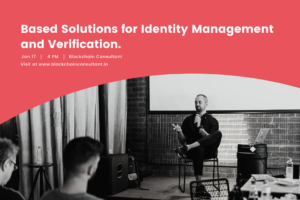Blockchain technology has gained significant traction in recent years. It is transforming the way businesses operate and interact with their customers. This technology is best known for its association with cryptocurrencies and versatility. Though it has many benefits, without proper expertise it is tough to apply to any business. This is where a blockchain consultant comes in.
A blockchain consultant has the skills and knowledge to apply blockchain solutions. We will explore the reasons why every business needs a blockchain consultant in 2023. At the end of this article, you will learn:
- Why do businesses need a blockchain consultant?
- Roles and Responsibilities of a Blockchain Consultant
- How to choose the right blockchain consultant?
The Basics of Blockchain Technology
Blockchain technology is a decentralized digital ledger that records transactions across a network. Its consensus algorithm ensures the authenticity and integrity of the recorded data.
Characteristics of Blockchain
- Decentralization: Its decentralized feature eliminates the need for intermediaries for validating transactions.
- Transparency: Accessibility to the same information ensures transparency and accountability.
- Security: The cryptographic algorithms ensure that data is secure and tamper-proof.
- Immutability: You cannot alter or delete the data recorded on the blockchain.
Benefits of Blockchain
- Increased Efficiency: Removing the uses of intermediaries ensure faster and more efficient transactions. Also, it reduces transaction fees.
- Enhanced Security: The cryptographic algorithms secure data and prevent fraud.
- Transparency: Blockchain’s transparent nature ensures all participants’ accessibility to the same information. It ensures trust and accountability.
Why Do Businesses Need a Blockchain Consultant?
Blockchain technology offers a wide range of benefits to businesses, but implementing it can be a daunting task. Here are some reasons why businesses need a blockchain consultant:
Blockchain Integration Challenges
Integrating blockchain technology into existing systems can be a complex and challenging process. For smooth integration, businesses must identify the right blockchain solutions for their needs.
A blockchain consultant can help businesses to identify the best blockchain solutions.
Also, a blockchain consultant can provide guidance to ensure a smooth integration.
Regulations and Compliance
Businesses must follow various regulations when implementing blockchain solutions. Failure to comply can result in costly fines and legal action. Businesses must stay updated to ensure compliance with the fast-evolving blockchain regulations.
A blockchain consultant can help businesses navigate complex regulatory requirements. It ensures they follow relevant laws and regulations. This can save businesses time and money and reduce the risk of legal action.
Security and Privacy Concerns
Implementing Blockchain technology requires careful consideration of data privacy and security. The distributed nature ensures that data is stored across multiple nodes, which can create security risks. Additionally, businesses must consider privacy concerns when implementing blockchain technology, particularly in industries that handle sensitive data, such as healthcare and finance.
A blockchain consultant can help businesses identify and mitigate security and privacy risks associated with blockchain implementation. This includes evaluating security protocols and developing strategies to ensure data privacy.
Blockchain Use Case Identification
Blockchain technology can add value to many business operations, but businesses must identify the most appropriate blockchain use cases for their operations.
A blockchain consultant can help businesses evaluate their operations and identify areas where blockchain technology can add value. This includes identifying areas where blockchain technology can reduce costs, increase efficiency, and improve transparency.
Business Process Optimization
Blockchain technology can streamline business processes and improve efficiency. A blockchain consultant can help businesses optimize their processes and develop blockchain-based solutions that increase efficiency and reduce costs. This includes evaluating existing processes and identifying opportunities for automation and optimization.
A blockchain consultant can also help businesses develop strategies for adopting blockchain technology in a way that maximizes its benefits and minimizes disruption to existing processes.
Key Roles and Responsibilities of a Blockchain Consultant
A blockchain consultant plays a critical role in helping businesses implement blockchain technology. Here are some key roles and responsibilities of a blockchain consultant:
Identifying and Evaluating Blockchain Solutions
Identifying and evaluating blockchain solutions is a crucial part of a blockchain consultant’s role. A blockchain consultant must have a deep understanding of various blockchain technologies and their use cases. They must be able to identify the most appropriate blockchain solution for a particular use case based on the client’s specific requirements.
To identify the best blockchain solution, a consultant must evaluate different blockchain technologies based on various factors such as scalability, security, interoperability, and consensus mechanism. They must also consider the client’s specific requirements, such as the need for privacy, data sharing, and smart contract functionality.
Once a blockchain consultant has identified the most appropriate blockchain solution, they must evaluate the feasibility of the solution. This includes assessing the cost and time required for implementation, as well as any potential risks and challenges associated with the solution.
Developing Blockchain Strategies and Plans
Developing blockchain strategies and plans is another key responsibility of a blockchain consultant. Blockchain consultants must work closely with their clients to understand their business needs and objectives. They must identify areas where blockchain technology can add value and develop strategies for implementing blockchain solutions that align with the client’s goals.
The consultant must also develop a detailed plan for implementing the blockchain solution. This includes identifying the resources required, creating a timeline for implementation, and outlining the steps required to ensure smooth integration with existing systems.
Collaborating with Other Teams
Collaborating with other teams is crucial to the success of blockchain implementation. A blockchain consultant must work closely with IT teams to ensure that the blockchain solution is integrated with existing systems. This includes evaluating the compatibility of the blockchain solution with the client’s current IT infrastructure and identifying any necessary modifications or upgrades.
A blockchain consultant must also work with legal teams to ensure that the blockchain solution complies with relevant regulations. This includes ensuring that the solution adheres to data protection and privacy laws, as well as any industry-specific regulations.
Finally, a blockchain consultant must work with business teams to ensure that the blockchain solution aligns with the client’s overall business goals and objectives. This includes ensuring that the solution meets the client’s specific requirements, such as the need for increased efficiency, cost savings, or improved transparency.
Implementing and Managing Blockchain Solutions
Implementing and managing blockchain solutions is a critical responsibility of a blockchain consultant. The consultant must oversee the implementation process, ensuring that the solution is integrated smoothly with existing systems and that any technical issues are addressed promptly.
Once the blockchain solution is implemented, the consultant must monitor the solution to ensure that it is functioning optimally. This includes performing regular maintenance and updates, as well as monitoring the performance of the blockchain solution to identify any potential issues.
Ensuring Regulatory Compliance
Ensuring regulatory compliance is another critical responsibility of a blockchain consultant. A consultant must stay up to date with changes in regulations and ensure that the blockchain solution implemented by their client complies with relevant regulations.
This includes identifying any regulatory requirements that may impact the implementation of the blockchain solution and ensuring that the solution meets these requirements. The consultant must also work with legal teams to ensure that any necessary legal documentation, such as privacy policies or user agreements, is in place.
Qualities to Look for in a Blockchain Consultant
Choosing the right blockchain consultant for your business can be a daunting task. You need someone who can understand your business needs and identify the most appropriate blockchain solution to meet those needs. Here are some key qualities to look for in a blockchain consultant:
Technical Skills and Knowledge
A blockchain consultant must have a deep understanding of blockchain technology, including its underlying architecture, security features, and consensus mechanisms. They must be able to evaluate different blockchain solutions and select the most appropriate one for a specific use case.
A good consultant should also have a strong understanding of other relevant technologies, such as cloud computing, cryptography, and distributed systems.
Industry-Specific Expertise
Every industry has its own unique requirements and challenges. A blockchain consultant must have industry-specific expertise and understand how blockchain technology can add value in a particular industry. For example, a consultant working in the healthcare industry must understand the specific regulatory requirements and privacy concerns that impact the use of blockchain technology in healthcare.
Problem-Solving and Analytical Skills
Blockchain technology is complex, and implementing it can be challenging. A blockchain consultant must have strong problem-solving and analytical skills to identify potential issues and find solutions. They must be able to analyze data and evaluate the feasibility of different solutions.
Communication and Collaboration Skills
A blockchain consultant must be able to communicate effectively with different teams, including IT, legal, and business teams. They must be able to explain complex technical concepts in simple terms and work collaboratively to develop a blockchain solution that meets the client’s specific requirements.
Creativity and Innovation
Blockchain technology is constantly evolving, and a good blockchain consultant must be creative and innovative in identifying new use cases for blockchain technology. They must be able to think outside the box and identify new opportunities for blockchain-based solutions that can add value to a business.
Final Thoughts
Blockchain technology is becoming increasingly important for businesses in various industries. By working with a skilled blockchain consultant, businesses can take advantage of the numerous benefits that blockchain technology has to offer and stay ahead of the competition.
Contact BlockchainConsultant.io to get the best professional help for implementing blockchain technology in your business. We provide consultation and paid services to help you in experiencing the exciting world of blockchain technology.

















4 Responses